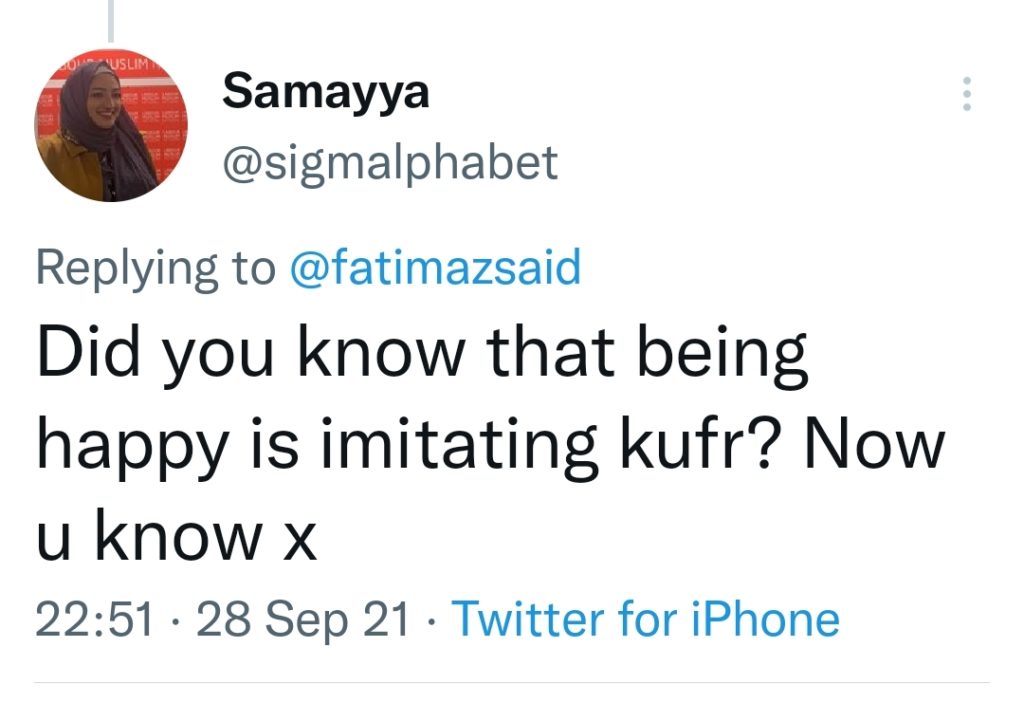Juveriah Alam says that stereotyping of Muslim women has become so entrenched that many can’t even imagine them having a good laugh.
This week, Dr Rakib Ehsan, a research director at the think-tank the Henry Jackson Society (which many believe is deeply Islamophobic), initiated a Twitter pile-on against a visibly Muslim woman for a sarcastic tweet of hers which he mistakenly thought was serious.
It all began when Twitter user, Fatima Said, said: “May Allah forgive me but I’m so excited for Christmas.”
Samayya Afzal, co-founder of the Labour Muslim Network then replied:
Now anyone mildly familiar with mainstream Muslim discourse would understand that Ms Afzal was being sarcastic here, poking fun at those who criticise other Muslims for doing anything celebratory that isn’t strictly Islamic.
While many mainstream Muslims are religiously observant, many also like to ridicule those Muslims who act holier-than-thou on social media, commonly known as the “haraam police.”
Subscribe to our newsletter and stay updated on the latest news and updates from around the Muslim world!
To misunderstand something as basic as this, one would have to be very out of touch with British Muslims as whole. However, Mr Ehsan succeeded in doing precisely this. Quote tweeting Ms Afzal, he wrote:
Clearly Mr Ehsan failed to pick up on Ms Afzal’s sarcasm and used this opportunity to trigger his own followers to instigate a Twitter pile-on against her.
Indeed, following this, Ms Afzal had to respond to several tweets from Mr Ehsan’s followers explaining that her tweet was actually sarcasm. Ms Afzal also repeatedly requested that Mr Ehsan delete his tweet but he failed to respond.
Following this incident, several Twitter users – Muslim and non-Muslim alike – expressed their disapproval of Mr Ehsan’s actions, including Miqdaad Versi of Muslim Council of Britain and the original tweeter who expressed her excitement for Christmas, Fatima Said.
Mr Ehsan then appeared to try to draw attention away from his outrageous tweet by engaging Mr Versi in a back and forth argument. However, he still failed to apologise, retract or even rationalise his tweet.
Targeting Muslim women
But it is the wording and context of Mr Ehsan’s tweet that remains worrying. It betrays his inability to consider that a British Muslim woman might actually have a British sense of humour.
It seems to me that within everything he propagates about British Muslims is the underlying notion that we are not really British. Clearly, the idea that Ms Afzal might have been joking was not in Mr Ehsan’s mind – too far-fetched an idea to even consider.
Most ironically, Mr Ehsan questioned Ms Afzal’s ability to “cultivate stronger interfaith relations” in Britain based on her joke tweet, while he himself, through his own tweet, sought to perpetuate further division. Bizarrely, the HJS website states that “social cohesion” and “race relations” are his areas of expertise. It is very worrying indeed that this individual has consulted parliamentarians and policy makes on these matters.
Further, I believe it reveals his low regard for Muslims in general, that he would jump to the worst conclusion he could think of instead of practicing husn al dhan, i.e. having positive regard for others rather than being quick to accuse them of ill-intent. This is an Islamic value of which it seems he has yet to become acquainted with.
It is also difficult to ignore the jubilant tone of Mr Ehsan’s tweet which began with “ladies and gentlemen” as though gleeful at the opportunity to expose a Muslim woman and someone who is also a supporter of the Labour party in one single tweet. Clearly in his mind this was a killing-two-birds-with-one-stone moment.
The Henry Jackson Society is a neoconservative pressure group which was paid over £80,000 by the Home Office to produce a report about Islamist terrorism. The right-wing William Shawcross was previously a director of HJS, only resigning after becoming chairman of the Charity Commission – an organisation which has been accused by many Muslim groups of singling out Muslim organisations to be investigated.
Earlier this year Shawcross was appointed by the government as the “Independent Reviewer of Prevent” – a counter terrorism strategy which many believe unfairly targets the Muslim community. Mr Ehsan – being a research fellow for HJS – gives us just a hint of the insidious nature of the Islamophobia industry and how it can affect public policy.
This was not simply a Twitter dispute – this was another example of the continued attacks on visible Muslim women in politics which seek to erase Muslim women from public life through intimidation and over-scrutinising their every word.
Ultimately, Ms Afzal and Ms Said are two outspoken Muslim female friends who were simply having some personal banter on Twitter. Mr Ehsan, unfortunately and rather creepily, decided to wade in to this space and display it to his many Islamophobic followers.
Such opportunism and glee in trying to catch out Muslim women is unsettling and also rather discouraging to Muslim women who may aspire to get involved in politics. Regardless of whether an apology or retraction is made, this has been a very revealing incident indeed.

























